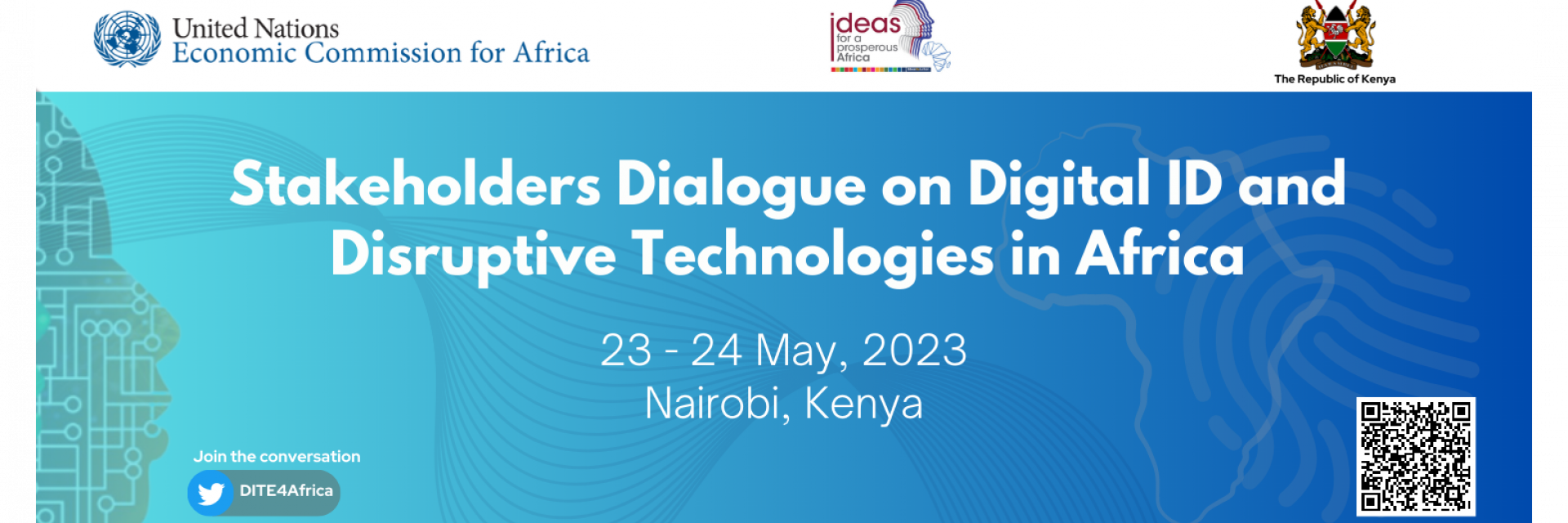Nairobi, Kenya, 22 May 2023 - The Economic Commission for Africa (ECA) convenes Stakeholders Dialogue on Digital ID and Disruptive Technologies in Africa, establishing a roadmap for African governments to implement digital ID systems aligned with the continental Digital Transformation Strategy. The regional workshop hosted in the margins of ID4Africa in Nairobi, aimed at fostering policy dialogue and priority setting considering mainstream adoption of generative artificial intelligence and implementation of a robust digital ID framework aligned with the African Union's Digital Transformation Strategy with a view to ensure that 99.9% of the African population has a digital legal ID by 2030, a significant step towards establishing a single digital market.
The Stakeholders Dialogue, convened as part of the larger ID4Africa initiative organized this year under the theme "Digital Identity as Public Infrastructure’’, brought together representatives from ministries, Data Protection Commissions, National Identity Management Offices, financial institutions, cybersecurity institutions, telecommunication companies, regional institutions, and multilateral organisations actively engaged in promoting Good Digital ID implementation. Delegates engaged in policy exchange, centered around contextualizing current technologies and trends, and providing recommendations for future steps. The event also fostered a collaborative community of practice focused on digital identity a focus on interoperability in terms of architecture, use and community.
Mactar Seck, Chief of Technology and Innovation Section at the ECA, emphasized the importance of digital ID systems in achieving the Sustainable Development Goals (SDGs).
"UNECA is embarking on successfully establishing a roadmap for African governments to implement digital ID systems that support the achievement of SDGs by improving access to services such as healthcare, education, and financial services, and promoting inclusive economic growth."
Mr. Seck further cited the need for strong political support and leadership from government institutions, urging governments to prioritize digital ID initiatives and allocate adequate resources for their success. He stated, "Digital ID initiatives require strong political support and leadership from government institutions. Governments need to prioritize digital ID initiatives and commit the necessary resources to ensure their success." Furthermore, Mr. Seck also highlighted the importance of scalability and interoperability of digital ID systems with other government systems, enabling their use across different sectors and government agencies including ‘health facilities, immigration services, company registration, etc’.
William Muhwava, Chief of the Demographic & Social Statistics Section at ECA’s African Centre for Statistics, underscored the significance of well-coordinated Civil Registration and Vital Statistics (CRVS) systems.
"Well-coordinated CRVS systems benefit every individual and inform public policy simultaneously. Leadership, along with advances in systems thinking, demographic analysis, and digital technologies, are key pillars for improving CRVS systems, which form the foundation of the digital public infrastructure in many countries."
Immaculate Kassait, Kenya’s Data Commissioner delivering her Opening remarks while referencing Kenya’s Economy Blueprint indicated that Digital Identity could leapfrog e-commerce in Africa and highlighted Data Protection Commissions’ key role in governing data.
‘‘Getting Digital Identity right will help us eliminate challenges of fraud in transactions, exclusion for stateless people and health care service access. We must be conscious of Data protection principles and ensure we design regulatory frameworks that take into account data privacy and deploy strong security safeguards. We need to develop strategies and technical standards for setting requirements for digital identity through these collaborations.’’
The Data Commissioner further commended ECA for bringing together varied stakeholders thus making sure there is a collaborative approach to Digital Identity in Africa.
Among the key outcomes of the Stakeholders Dialogue is the establishment of a roadmap for African governments to implement digital ID systems aligned with the continental Digital Transformation Strategy. The event also identified policy priorities and formulated recommendations for the next efficient interventions in ongoing work with member states. Currently, ECA is supporting the implementation of the Good Digital ID Framework Principles in several member states, including Ethiopia, Nigeria, Togo, and Benin.
For more information about the Stakeholders Dialogue on Digital ID and Disruptive Technologies in Africa, please contact:
Mactar Seck Email: Seck8@un.org
Linda Bonyo Email: Linda.bonyo@un.org
Abiy Goshu Email: abiy.goshu@un.org
About UNECA: The United Nations Economic Commission for Africa (UNECA) is one of the five regional commissions of the United Nations, established to promote economic and social development in Africa. UNECA works closely with member states, regional institutions, and other partners to support sustainable development, policy dialogue, research, and capacity-building initiatives across the continent. Among its key digital transformation deliverables for its members states is supporting the implementation of the Good Digital ID Framework Principles as enabling factors for Africa’s digital economy, inclusive growth, and regional integration.
Issued by:
Communications Section
Economic Commission for Africa
PO Box 3001
Addis Ababa
Ethiopia
Tel: +251 11 551 5826
E-mail: eca-info@un.org

